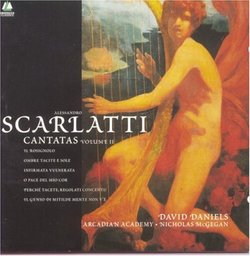Daniels and McGegan Score with Scarlatti Program
Ed Uyeshima | San Francisco, CA USA | 08/23/2004
(5 out of 5 stars)
"Back in early 1998, music director Nicholas McGegan had the foresight to select the prodigiously talented countertenor David Daniels to be his vocal soloist for this program; the second in a series of four discs devoted to the works of composer Alessandro Scarlatti (1660-1725). Scarlatti was quite prolific in his career writing over 60 operas, and selections from six of those operas are presented here. Although his music does not reach the musical heights of Handel, Scarlatti's work is certainly varied enough to provide the perfect showcase for Daniels' amazing voice. Accompanied by the Arcadian Academy, he is in full bloom here alternating between tender and passionate. As usual, his Italian is impeccable as he enunciates every word with great flair, and he never gets carried away with the more elaborate passages. Dramatically he is in peak form, and it is unlikely just a coincidence that like the accomplished "Masque of Alfred" cast recording released in 2000, this disc shares the talents of Daniels, McGegan and several members of the Philharmonia Baroque Orchestra.
The most complete piece of this recording is the third, "Perché tacete, regolati concenti?", which seems like a mini-Venetian opera over its 19-minute running time. It contains the most musical diversity with instrumental passages that reflect effectively the different moods of the piece. The remaining pieces revolve around various quandaries about love, and the variety of tones and harmonic progessions is quite impressive. My personal favorite is the second piece, "Il genio di Mitilde", which uses strings in an almost athletic fashion to reflect the various whims of a young woman's capricious changes of heart. The final piece, "Infirmata, vulnerata", opens with the melancholy Largo aria, where Daniels is accompanied beautifully by two interweaving violins, and finishes with the dramatically propulsive Allegro. This disc is a perfect addition to any Baroque music collection and a must-have for any fan of David Daniels.
"
A voice teacher and early music fan
George Peabody | Planet Earth | 05/13/2006
(5 out of 5 stars)
"DANIELS DELIVERS SCRUMPTIOUS SCARLATTI.
Alessandro(Papa Scarlatti)(1659-1705) was the first great master of Neopolitan opera. In addition to that he has composed several instrumental pieces, many cantatas and oratorios and much church music. Historians agree upon his importance as a link in the chain of the opera's development, and many of his arias are still sung.
However, until recently the genius of his son Domenico's keyboard sonatas and the unavailability of his own music overshadowed his contributions. But in the 18th century Alessandro became the most widely performed Italian composer of vocal music with more than sixty operas and well over six hundred cantatas. Six of these are perfomed beautifully by David Daniels and the Arcadian Academy under the direction of Nicholas McGegan.
The simplest work on this disc, in scoring and structure is 'Il rosignolo'(the nightingale) dated December 19,1698. The voice is accompanied only by the basso continuo,and the cantata consists merely of two 'da capo' arias,both of which describe a peaceful pastoral setting.
'O Pace del mio cor'(Oh my heart's peace) is likewise scored only for basso continuo. The entire cantata is given over to a single textual idea, an obsessional quest for peace of mind, which the lovesick poet vainly seeks in Nature where peace is to be found.
The cantata 'Il genio di Matilde' (Matilda's nature is very different in character, for it tells the story of a capricious woman with many changes of heart). Consequently, the music is more varied in tempi, vocal tonality and melodic line. However, the form and the scoring is much like the other cantatas.
'Ombre tacite e sol ' (silent and solitary shadows),dated October 31,1716, is the most fully scored work in this group, calling for two violins, viola and basso continuo. It is the story of a deceived lover, whose excessive self-dramatization is portrayed via the music itself and Scarlatti's excellent use of instrumental and vocal effects. The picture is a dark forest, waves breaking against the rocks,the howling of wild beasts, and the hissing of snakes. There are frequent and dramatic harmonic changes as well as rhythmic variety.
'Perche tacete' (Why are you silent, ordered harmonies?),written in 1694, is preceded by a three-movement instrumental introduction, after the manner of Corelli, whom Scarlatti knew very well. There is expressive vocal enlargement at pictorial works like 'scherza','sferza','amor'dolor''desir'and 'sospir'.
'Infirmata,vulnerata' (Weak,wounded)dated October 16,1702,is rare, because though it is a Latin Motet, it is not(unlike Scarlatti's other motets)centered on relgious words but on amatory sentiments. I personally think that these are very well chosen for there is much variety in form, instrumental accompaniment and most especially tempo.
This recording was made in 1996, very early in Daniel's career and one that I think was signiicant in bringing him to 'the top of the heap' of budding countertenors. The son of two voice teachers in South(?) Carolina he began his musical life as a boy soprano and subsequently at the University of Michigan as a tenor who eventually found his 'real' voice as a 'falsettist' which can be referred to as a male alto, but mostly as a countertenor. His renditions of Scarlatti are excellent and for me this has been a much enjoyed album.
McGegan, along with Daniels 'tear' through the fast passages VERY FAST indeed, but skillfully; Daniels interprets beautifully in the slower sections. The album is accompanied by a fifty page booklet that includes pertinent information and the text in English, French, Italian and German.
"


 Track Listings (32) - Disc #1
Track Listings (32) - Disc #1